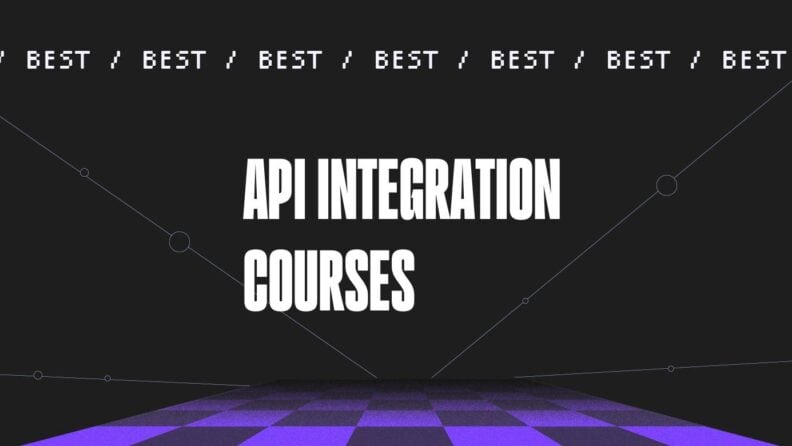Let's face it: API integrations are the glue that holds modern software together. They allow different systems to talk to each other, making our digital lives smoother and more efficient.
But mastering the art of API integration isn't always a walk in the park. That's why I've curated a list of the 18 best courses to help you level up your skills. Whether you're a seasoned developer or just starting, these courses will equip you with the knowledge and tools to build robust and scalable API integrations.
Best API Integration Courses Shortlist
Here's a shortlist of the best API integration courses I think are worth your time in 2025:
- Mastering APIs: Building and Integrating with Web Services (Learndrive)
- Building RESTful APIs Using Node.js and Express (NIIT)
- REST APIs with Flask and Python (Udemy)
- Introduction to APIs in Python (DataCamp)
- Learn API Documentation with JSON and XML (LinkedIn Learning)
- NodeJs API for Beginners (Udemy)
- APIs for Beginners - How to use an API (freeCodeCamp)
- Programming Foundations: APIs and Web Services (LinkedIn Learning)
- Jmeter with API Course (Koenig Solutions)
- Calling REST APIs with Java (LinkedIn Learning)
- Postman: The Complete Guide - REST API Testing (Udemy)
- APIs in Java: Call and Integrate an API (Coursera)
- API for beginners JavaScript Getting Started with APIs AJAX (Udemy)
- API Testing with Postman, Rest Assured and SOAP UI Course (Koenig Solutions)
- Learning REST APIs (LinkedIn Learning)
- API Development: REST & SOAP Web Services (Skillsoft)
- API Testing Foundations (LinkedIn Learning)
- Learn Rest API & Integration Basics | Salesforce Development (Udemy)
Find out each detail of the course below.
Overview Of The Best API Integration Courses
1. Mastering APIs: Building and Integrating with Web Services (Learndrive)
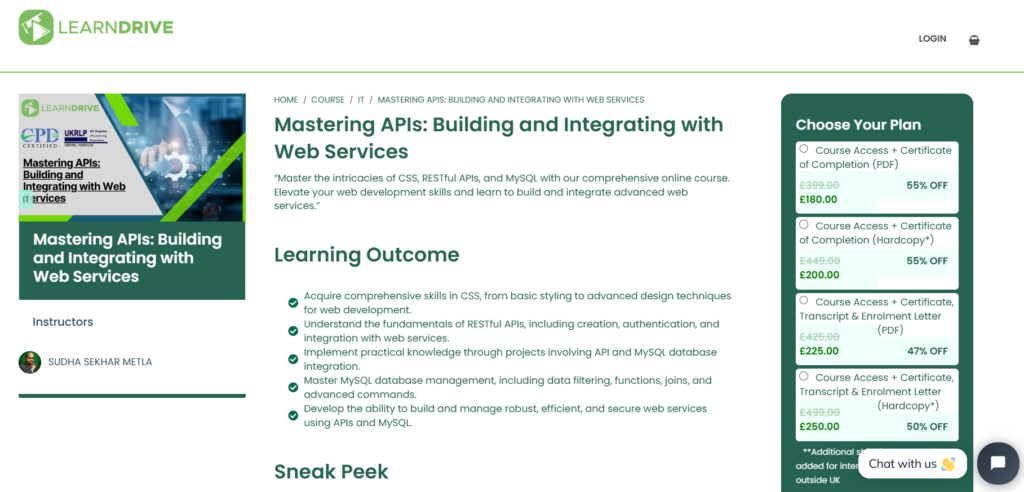
This course provides an online learning platform focusing on building and integrating APIs with web services. It includes hands-on modules to develop practical API creation, integration, and MySQL database management skills.
- Who It’s For: Developers looking to upskill their API integration skills, individuals working in the industry, and individuals who want to transition
- Topics Covered:
- CSS fundamentals and advanced styling
- RESTful API creation and authentication
- MySQL database management and integration
- Practical projects on API and MySQL integration
- Online, In-Person, or Both? Online
- Exam Required? No
- How Many Hours Of Instruction: Self-paced
- Eligibility Requirements:
- Interest in learning and a good grasp of English, mathematics, and computer skills
- Price:
- Course Access + Certificate of Completion (PDF): £399.00
- Course Access + Certificate of Completion (Hardcopy): £449.00
- Course Access + Certificate, Transcript & Enrolment Letter (PDF): £425.00
- Course Access + Certificate, Transcript & Enrolment Letter (Hardcopy): £499.00
- Take The Course: Learndrive
2. Building RESTful APIs Using Node.js and Express (NIIT)
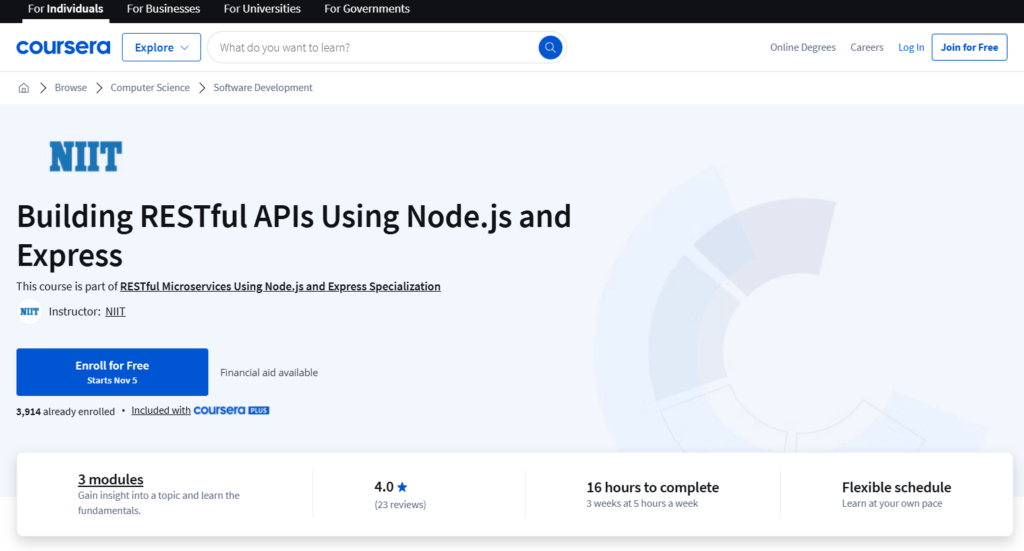
This course teaches you how to build and document RESTful APIs. You will learn to create APIs that can handle requests from frontend applications and send the right responses. The course also covers how to document your APIs using Swagger.
- Who It’s For: Beginner to intermediate developers interested in Node.js
- Topics Covered:
- RESTful API design with Node.js
- Using Express.js for backend development
- Securing APIs with JWT and OAuth
- API documentation with Swagger
- Implementing Express Router
- Online, In-Person, or Both? Online
- Exam Required? No
- Duration: 16 hours
- How Many Hours Of Instruction: 5 hours per week (self-paced)
- Eligibility Requirements: None
- Price: Free
- Take The Course: Coursera
3. REST APIs with Flask and Python in 2024 (Udemy)
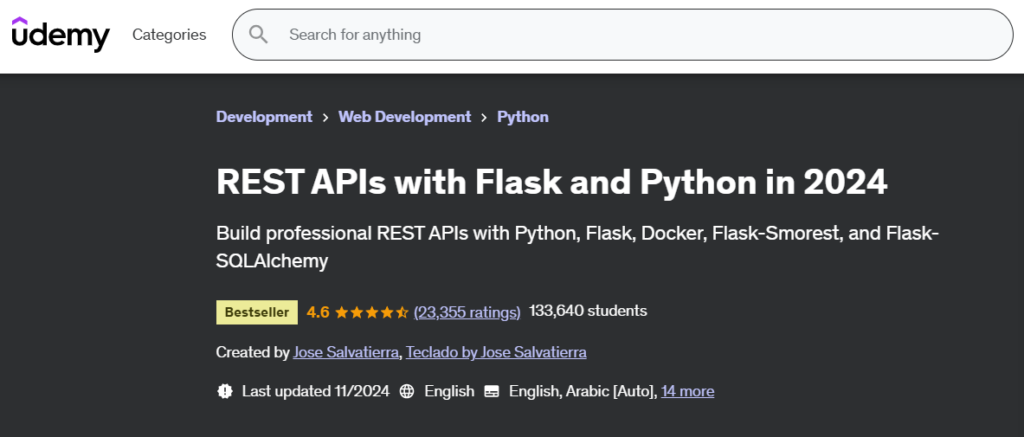
This course focuses on building production-ready REST APIs using Flask and Python, guiding learners through authentication, database integration, and deployment. Through real-world projects, it explores essential tools and extensions to support secure, scalable API development.
- Who It’s For: Software engineers and developers aiming to enhance their REST API skills with Python and Flask skills
- Topics Covered:
- Python fundamentals and advanced features
- REST API development with Flask
- Authentication with Flask-JWT-Extended
- Database integration using Flask-SQLAlchemy
- Docker deployment for REST APIs
- Version control with Git
- Database migrations with Alembic
- Online, In-Person, or Both? Online
- Exam Required? No
- Duration: 12 hours
- How Many Hours Of Instruction: Self-paced
- Eligibility Requirements:
- Prior programming experience in any language
- Beginner Python course for complete beginners
- Price: $129.99
- Take The Course: Udemy
4. Introduction to APIs in Python (DataCamp)
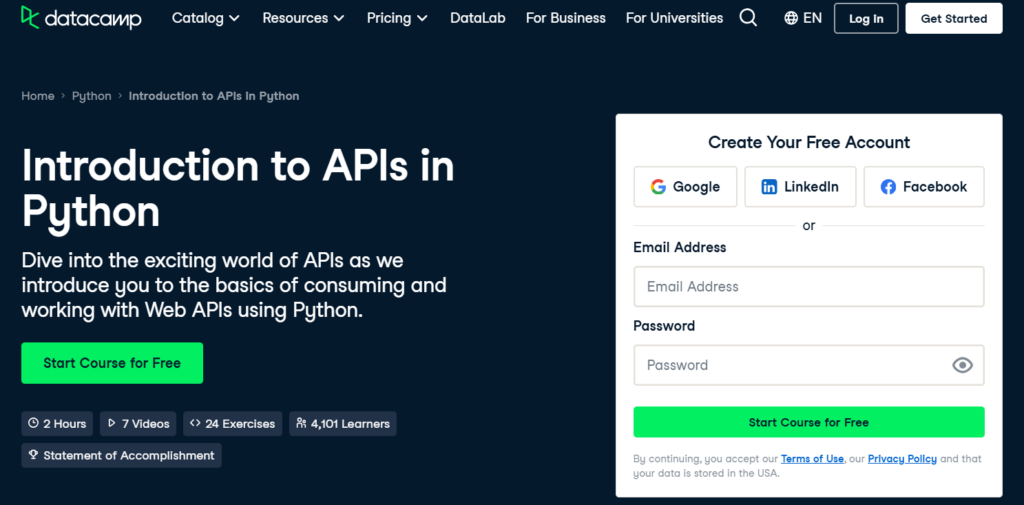
This course introduces the essentials of working with web APIs in Python, using hands-on exercises to teach students how to make requests and handle responses. Learners will practice integrating APIs into applications, covering core skills for managing data exchanges effectively.
- Who It’s For: Beginners with basic Python knowledge
- Topics Covered:
- Basics of API requests and responses
- Using Python requests package
- HTTP request components
- Handling headers and interpreting status codes
- Working with JSON data
- Basic and token-based authentication
- Online, In-Person, or Both? Online
- Exam Required? No
- Duration: 2 hours
- How Many Hours Of Instruction: Self-paced
- Eligibility Requirements: Intermediate Python skills required
- Price: Free
- Take The Course: DataCamp
5. Learn API Documentation with JSON and XML (LinkedIn Learning)

This course provides a practical approach to documenting web APIs, covering both JSON and XML data formats. Through structured lessons, learners gain skills for creating clear, effective documentation that guides developers in using API data correctly.
- Who It’s For: Technical writers and developers
- Topics Covered:
- Basics of API request and response documentation
- Structured data documentation in JSON and XML
- Key data types and collections (numbers, text, arrays, dictionaries)
- Pros and cons of documentation tools (wikis, knowledge bases)
- Online, In-Person, or Both? Online
- Exam Required? No
- Duration: 1 hour and 18 minutes
- How Many Hours Of Instruction: Self-paced
- Eligibility Requirements: None
- Price: Free for a month
- Take The Course: LinkedIn Learning
6. NodeJs API for Beginners (Udemy)
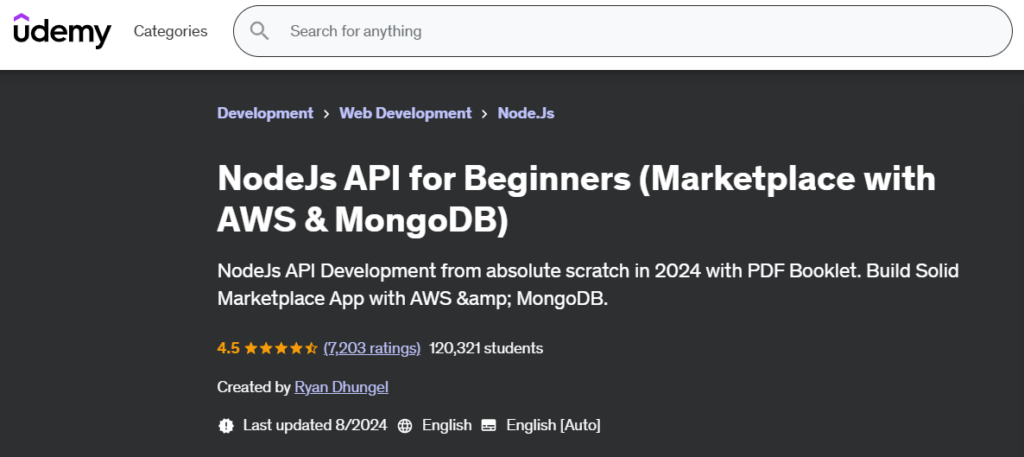
This online course provides beginners with hands-on experience building APIs with Node.js, using step-by-step guidance to create a functional real estate marketplace API. Through practical examples, learners gain skills in server setup, database integration, and API functionalities.
- Who It’s For: Beginners interested in learning Node.js API development from scratch
- Topics Covered:
- Node.js fundamentals and event loop
- API development with Express and MongoDB
- Authentication and password management
- Email integration with AWS SES
- Image storage using AWS S3
- Google Maps geolocation integration
- CRUD operations for real estate listings
- Cloud deployment
- Online, In-Person, or Both? Online
- Exam Required? No
- Duration: 12 hours and 15 minutes
- How Many Hours Of Instruction: Self-paced
- Eligibility Requirements:
- A fundamental understanding of JavaScript or any other programming language
- Price: $19.99
- Take The Course: Udemy
7. APIs for Beginners - How to use an API (freeCodeCamp)
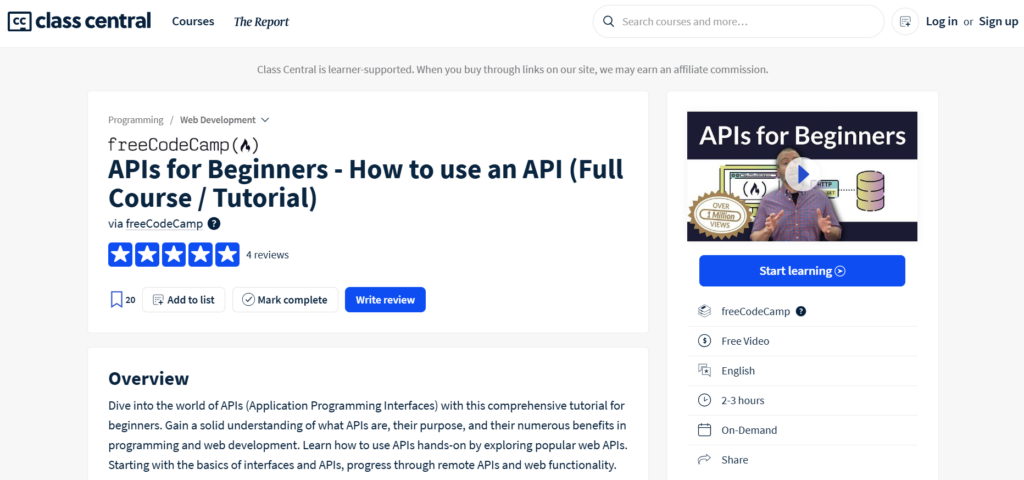
This course introduces the fundamentals of using Application Programming Interfaces (APIs) through a hands-on tutorial, covering API interaction and integration essentials. Learners work with popular web APIs and explore how to apply API knowledge practically in projects.
- Who It’s For: Beginners interested in learning how to discover and use APIs in web development
- Topics Covered:
- Basics of APIs and interfaces
- RESTful API principles
- Using APIs online and via command line
- API interaction with Postman
- Implementing helper libraries in JavaScript and Python
- Building a project with Flask and creating a JavaScript Single Page Application
- Online, In-Person, or Both? Online
- Exam Required? No
- Duration: 2 to 3 hours
- How Many Hours Of Instruction: Self-paced
- Eligibility Requirements: None
- Price: Free
- Take The Course: freeCodeCamp
8. Programming Foundations: APIs and Web Services (LinkedIn Learning)

This course focuses on building web services using several popular technologies. It explains the benefits of web services and provides a detailed comparison of different technologies, highlighting their messaging formats. The course also includes coding examples in languages like Java, Python, and Swift to demonstrate server- and client-based implementations.
- Who It’s For: Beginners in software development and web services
- Topics Covered:
- APIs vs. web services
- REST and SOAP
- API calls with HTTP
- XML and JSON
- Authentication with OAuth
- Using RESTful APIs and HATEAOS
- Using SOAP-Based Web Services
- Develop APIs Using GraphQL
- Online, In-Person, or Both? Online
- Exam Required? No
- Duration: 1 hour and 16 minutes
- How Many Hours Of Instruction: Self-paced
- Eligibility Requirements: None
- Price: Free for a month
- Take The Course: LinkedIn Learning
9. Jmeter with API Course (Koenig Solutions)
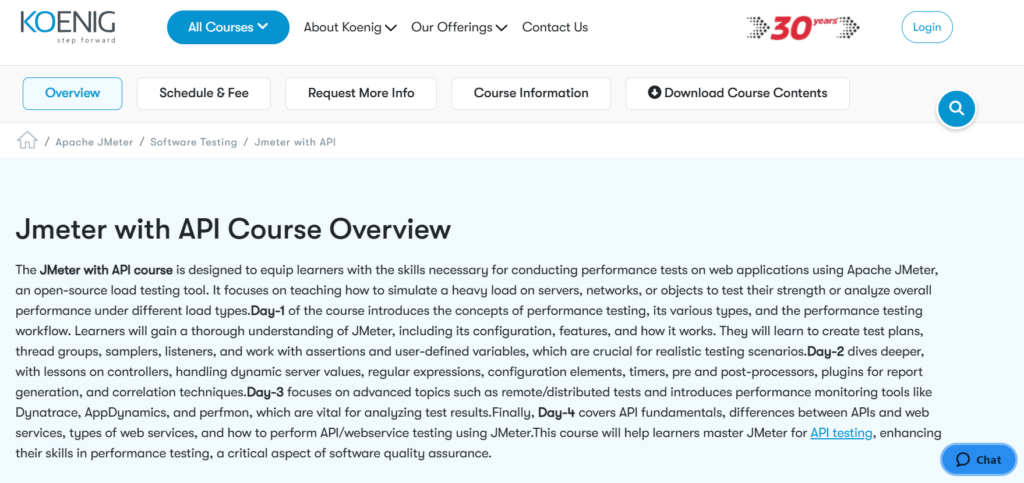
This course teaches performance testing for web applications and APIs using Apache JMeter, covering essential skills to simulate server loads and analyze performance. Through hands-on practice, participants create and manage test plans, configure elements, and utilize monitoring tools for effective API testing.
- Who It’s For: Developers or testers looking to test APIs, quality assurance engineers, technical support specialists, DevOps engineers, IT project managers, and system administrators
- Topics Covered:
- Performance testing fundamentals and workflows
- JMeter configuration and test plans
- Thread groups, samplers, and listeners
- Assertions, variables, and regular expressions
- Controllers, timers, and plugins for reports
- Remote and distributed testing techniques
- API and web service testing with JMeter
- Online, In-Person, or Both? Both
- Exam Required? No
- Duration: 32 hours
- How Many Hours Of Instruction: 8 hours per day
- Eligibility Requirements:
- Basic understanding of software development and testing concepts
- Familiarity with performance testing principles and purpose
- Basic knowledge of web technologies, including HTTP, HTTPS, and web servers
- Elementary programming or scripting knowledge (optional but useful for JMeter scripting)
- Basic experience with any testing tool (helpful but not required)
- Ability to work in Windows or Linux environments for JMeter setup and configuration
- Understanding of APIs and client-server communication
- Price:
- 1-on-1: $1,650
- Public: $1,275
- Take The Course: Koenig Solutions
10. Calling REST APIs with Java (LinkedIn Learning)
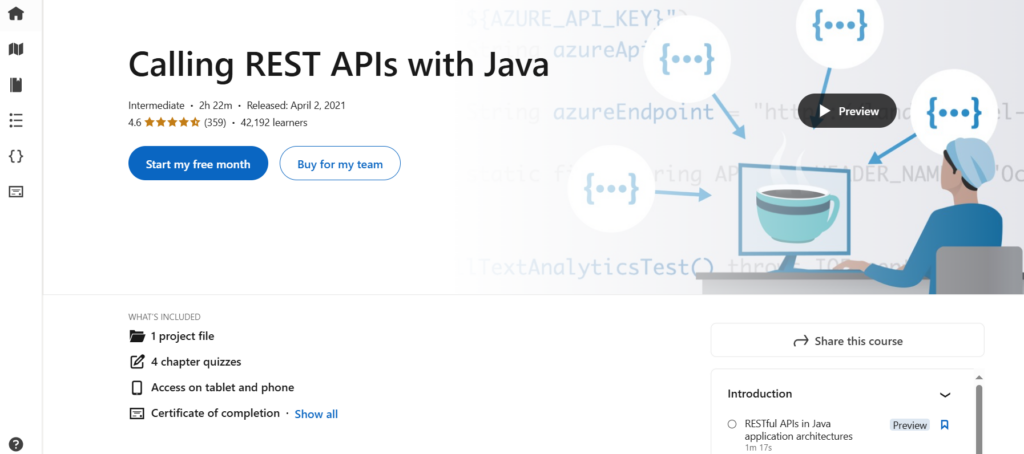
This course focuses on calling REST APIs in Java, using practical examples with popular third-party APIs like Azure Cognitive Services, Twitter, and Twilio. Each module demonstrates specific Java API integration techniques and hands-on lessons for real-world applications.
- Who It’s For: Java developers wanting to learn REST API integration
- Topics Covered:
- REST API principles
- Java HTTP client
- JSON data handling
- Error handling in APIs
- API authentication
- RESTful APIs in Java
- Twitter API using Spring’s WebClient
- Twilio API using OpenFeign
- Online, In-Person, or Both? Online
- Exam Required? No
- Duration: 2 hours and 22 minutes
- How Many Hours Of Instruction: Self-paced
- Eligibility Requirements: None
- Price: Free for a month
- Take The Course: LinkedIn Learning
11. Postman: The Complete Guide - REST API Testing (Udemy)
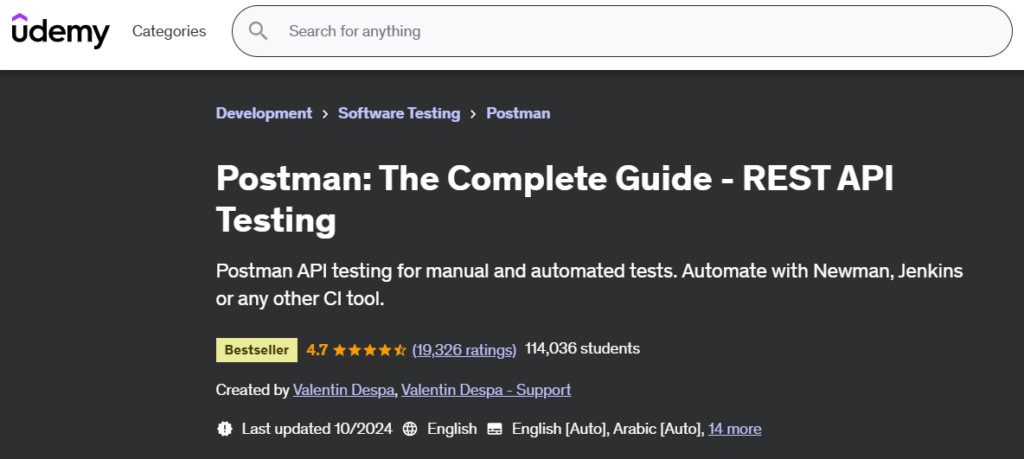
This course provides an in-depth guide to using Postman for REST API testing, covering everything from setting up simple requests to running automated tests in a CI environment. It includes practical lessons on HTTP methods, authentication, test writing, and organizing tests within collections.
- Who It’s For: Those interested in API testing with Postman, testing engineers, and developers
- Topics Covered:
- HTTP request methods (GET, POST, PUT, PATCH, DELETE)
- Working with JSON format
- Authentication mechanisms (Basic Auth, API Keys, OAuth)
- Writing and organizing API tests
- Integrating Postman tests into CI servers like Jenkins
- Advanced Postman features and user questions
- Online, In-Person, or Both? Online
- Exam Required? No
- Duration: 21 hours and 30 minutes
- How Many Hours Of Instruction: Self-paced
- Eligibility Requirements:
- Basic programming or JavaScript knowledge
- Familiarity with HTTP concepts (address, headers, cookies)
- Basic RESTful API and JSON knowledge
- Basic NodeJS and optional Docker experience for advanced testing
- Price: $109.99
- Take The Course: Udemy
12. APIs in Java: Call and Integrate an API (Coursera)
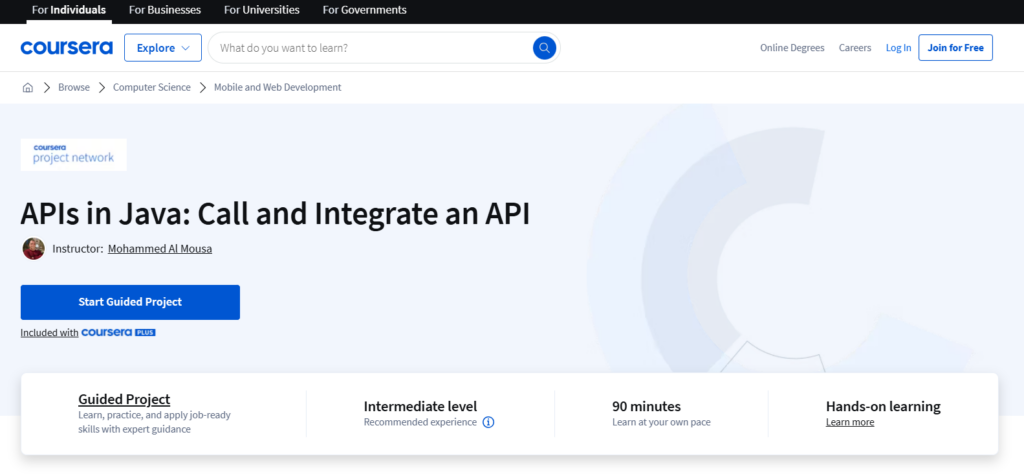
This course offers practical experience integrating APIs with Java, including exercises that simulate real-world applications. Using Eclipse and Maven, you'll learn how to create REST endpoints for managing data like student and customer lists. By the end, you'll have the skills to implement API endpoints in Java efficiently, with a focus on hands-on learning in a simulated environment.
- Who It’s For: Java developers interested in integrating APIs
- Topics Covered:
- REST API methods and usage
- Setting up API endpoints with Java
- Creating and managing a HelloWorld API
- Passing arguments to Java APIs
- Using Java collection libraries in APIs
- Customer management API project
- Online, In-Person, or Both? Online
- Exam Required? No
- Duration: 90 minutes
- How Many Hours Of Instruction: 90 minutes (self-paced)
- Eligibility Requirements:
- Knowledge of Java programming
- Familiarity with Eclipse, Maven, and Postman
- Understanding of the client-server model
- Take The Course: Coursera
13. API for beginners JavaScript Getting Started with APIs AJAX (Udemy)
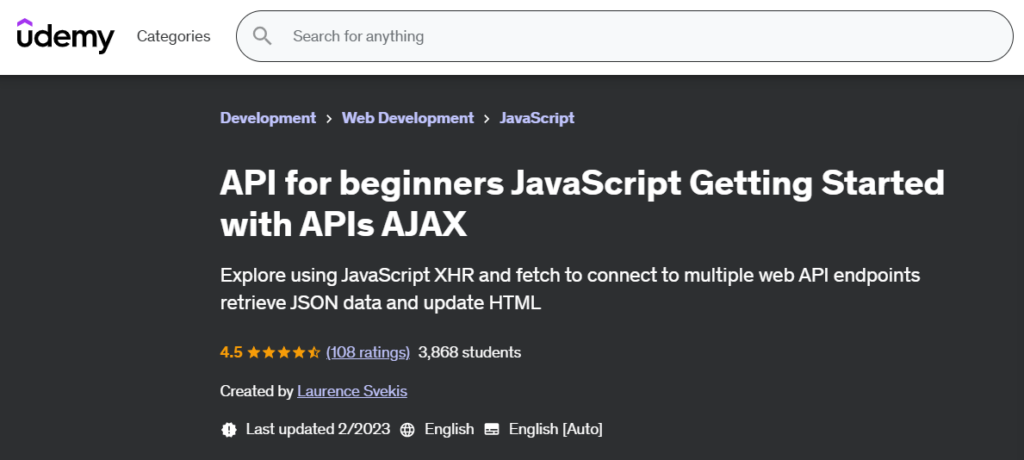
This course provides hands-on experience in using JavaScript to connect with web APIs through AJAX and fetch, demonstrating how to retrieve JSON data and display it in web applications. It includes examples with various APIs, allowing learners to practice creating AJAX requests and handling API responses.
- Who It’s For: Beginners interested in JavaScript and API integration, web developers, and JavaScrip developers
- Topics Covered:
- Making AJAX requests with XMLHttpRequest
- Fetch API for JSON data retrieval
- Connecting to various web APIs
- JavaScript objects and JSON data handling
- Error handling and response management
- Setting up custom JSON endpoints
- ES6 JavaScript features for APIs
- Online, In-Person, or Both? Online
- Exam Required? No
- Duration: 1 hour and 30 minutes
- How Many Hours Of Instruction: Self-paced
- Eligibility Requirements:
- JavaScript knowledge (prerequisite)
- Basic experience with HTML and web development
- Price: $54.99
- Take The Course: Udemy
14. API Testing with Postman, Rest Assured and SOAP UI Course (Koenig Solutions)
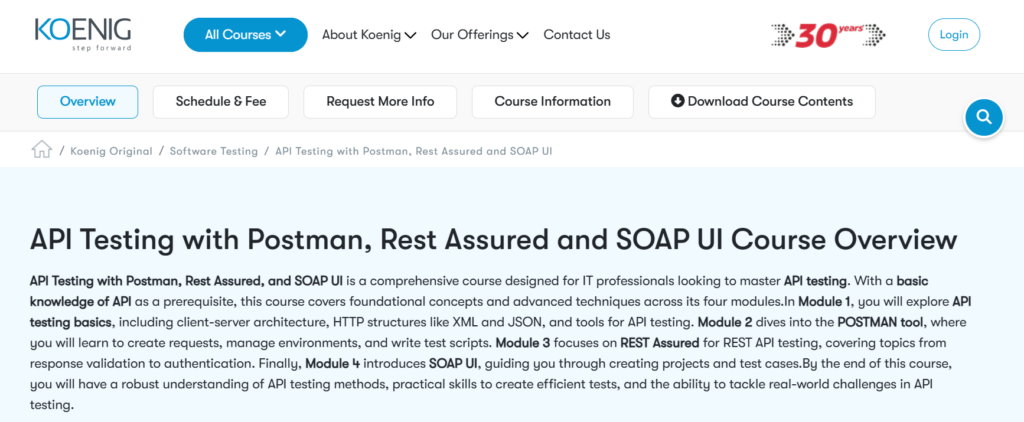
This training course offers comprehensive API testing instructions with Postman, Rest Assured, and SOAP UI, teaching learners to create, validate, and execute effective API tests. It covers key concepts like HTTP basics, JSON/XML handling, and advanced automation techniques using industry-standard tools.
- Who It’s For: API testers, Application Developers, QA engineers, technical leads, testing managers, systems analysts, IT professionals, quality assurance managers, and IT consultants
- Topics Covered:
- Client-server architecture fundamentals
- HTTP methods, status codes, and URI/URL usage
- JSON and XML data formats in API communication
- Postman for requests, collections, and test scripting
- REST Assured setup and API response validation
- Authentication and authorization in REST APIs
- SOAP UI project creation and test case development
- Online, In-Person, or Both? Both
- Exam Required? No
- Duration: 24 hours
- How Many Hours Of Instruction: 8 hours per day
- Eligibility Requirements:
- Familiarity with basic API concepts and principles
- Basic knowledge of client-server interactions
- General understanding of HTTP methods (GET, POST, etc.) and status codes
- Basic knowledge of formats like XML, JSON
- Understanding of URIs and URLs
- Price:
- 1-on-1: $1,450
- Public: $1,150
- Take The Course: Koenig Solutions
15. Learning REST APIs (LinkedIn Learning)
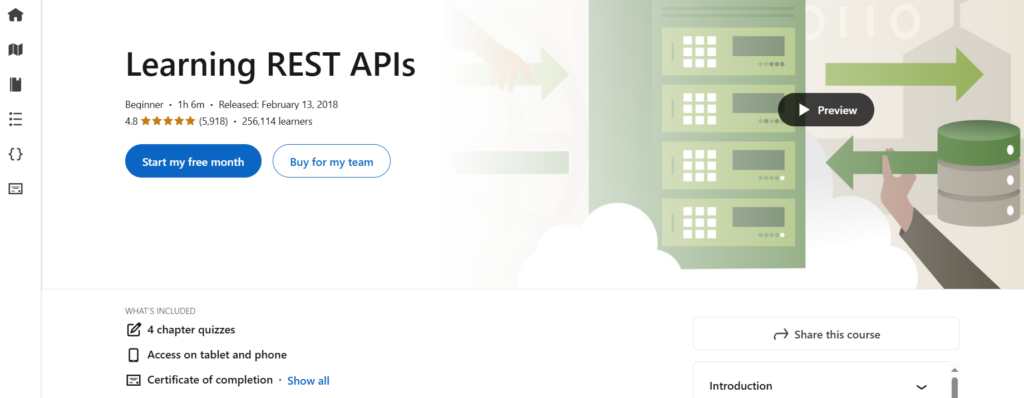
This course introduces the architecture and practical use of REST APIs in web applications. You will learn why they are important and how they can make your applications more efficient. The course also explains key concepts, such as constraints and status messages, and how to integrate APIs into your projects.
- Who It’s For: Developers and IT professionals interested in learning REST API basics
- Topics Covered:
- Basics of REST APIs
- HTTP and REST API relationship
- REST architectural constraints
- HTTP status codes and messages
- Consuming REST APIs in applications
- Online, In-Person, or Both? Online
- Exam Required? No
- Duration: 1 hour and 6 minutes
- How Many Hours Of Instruction: 1 hour and 6 minutes
- Eligibility Requirements: None
- Price: Free for a month
- Take The Course: LinkedIn Learning
16. API Development: REST & SOAP Web Services (Skillsoft)
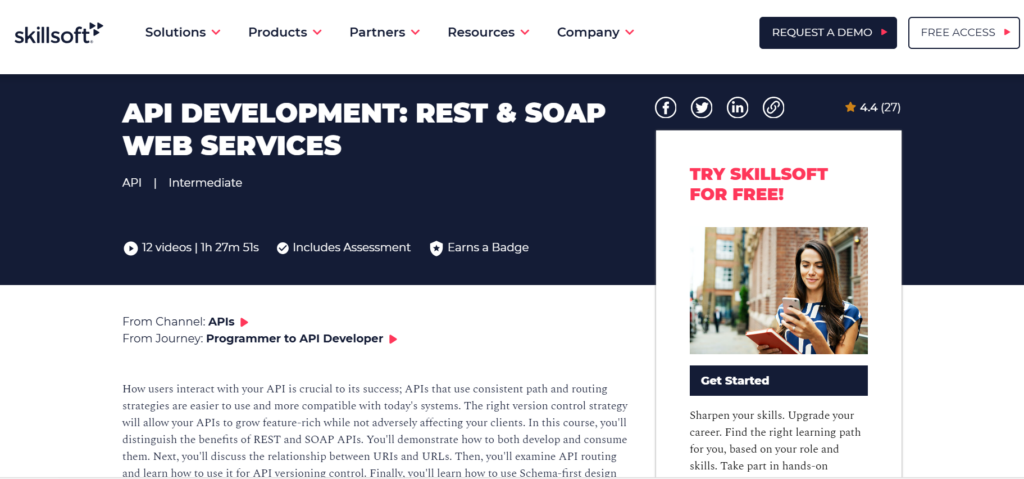
This course covers the development and consumption of REST and SOAP APIs, demonstrating how to create APIs using Visual Studio and manage them with tools like Swagger and SoapUI. Learners will also explore API versioning, routing, and schema-first design to build adaptable, well-structured web services.
- Who It’s For: Developers, programmers, and IT professionals
- Topics Covered:
- REST and SOAP API fundamentals
- Creating SOAP web services in Visual Studio
- Consuming SOAP APIs with SoapUI
- Building REST APIs using OpenAPI and Swagger
- URI vs. URL in web services
- API routing and version control
- Schema-first design for APIs
- Online, In-Person, or Both? Online
- Exam Required? No
- Duration: 1 hour 27 minutes and 51 seconds
- How Many Hours Of Instruction: Self-paced
- Eligibility Requirements: None
- Price:
- Individual: $20 per month and $199 per year (45-day free access)
- Team: $55 per month and $500 per year
- Take The Course: Skillsoft
17. API Testing Foundations (LinkedIn Learning)
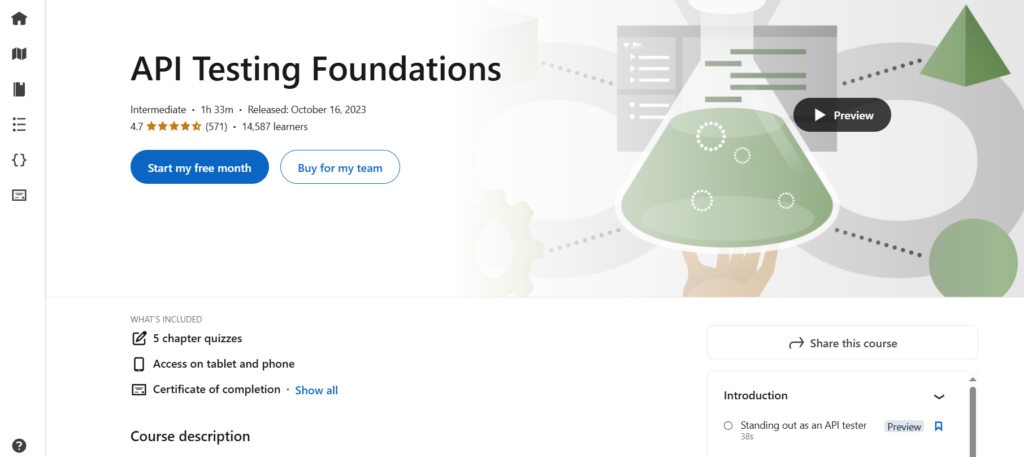
This course teaches essential skills in API testing, covering key techniques to ensure functionality and performance. It demonstrates how to apply effective testing methods using standard tools and explains performance and security testing approaches.
- Who It’s For: Software testers and developers
- Topics Covered:
- Web services and API terminology
- Testing with Postman
- Testing methodologies for HTTP requests
- Performance testing basics
- Security testing essentials
- Online, In-Person, or Both? Online
- Exam Required? No
- Duration: 1 hour and 33 minutes
- How Many Hours Of Instruction: Self-paced
- Eligibility Requirements: None
- Price: Free for a month
- Take The Course: LinkedIn Learning
18. Learn Rest API & Integration Basics | Salesforce Development (Udemy)
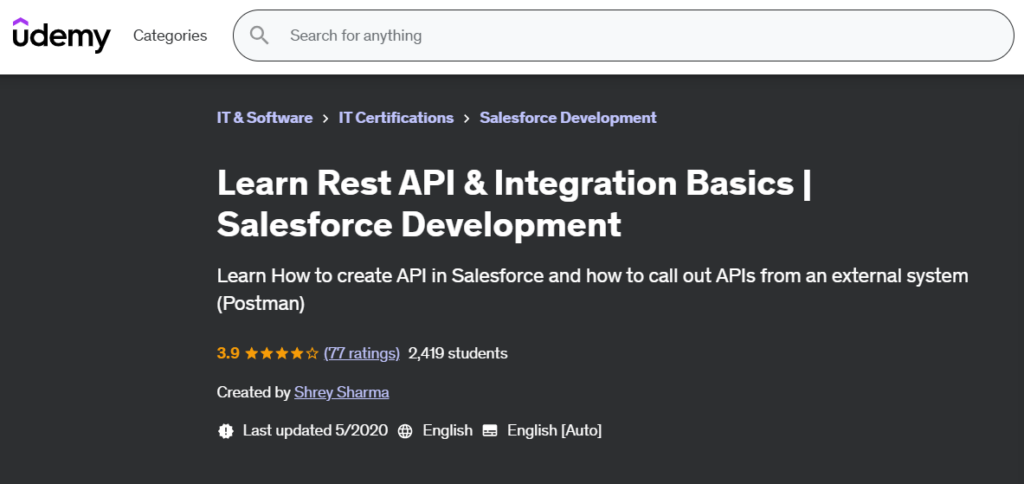
This course introduces REST API fundamentals and integration techniques specific to Salesforce development, guiding learners through creating and using APIs within Salesforce. It covers key concepts like Apex API, callouts, and integration with external systems using tools like Postman.
- Who It’s For: Salesforce developers and administrators and beginner Salesforce developers
- Topics Covered:
- Introduction to APIs and integrations in Salesforce
- REST API basics and applications in Salesforce
- Apex API creation and Apex callouts
- Using Postman for API calls from external systems
- Differences between Apex API and Apex callouts
- Online, In-Person, or Both? Online
- Exam Required? No
- Duration: 58 minutes
- How Many Hours Of Instruction: 58 minutes
- Eligibility Requirements:
- Basic programming skills
- Price: $22.99
- Take The Course: Udemy
What’s Next?
By investing in these top-notch courses, you'll be well-prepared to tackle the challenges and opportunities of API integration. Remember, practice makes perfect!
Boost your SaaS growth and leadership skills. Subscribe to our newsletter for the latest insights from CTOs and aspiring tech leaders. We'll help you scale smarter and lead stronger with guides, resources, and strategies from top experts!

